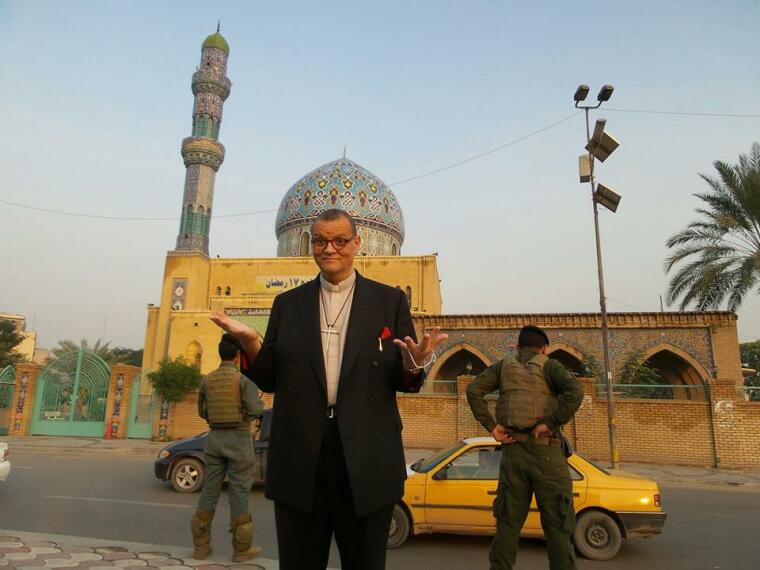Vicar of Baghdad admits ISIS should be 'radically destroyed'

LONDON (Christian Examiner) – Canon Andrew White, the Emeritus Vicar of Baghdad, says ISIS is different from other militant groups he's seen in the Middle East.
After the number of Christians in Iraq has been reduced from 1.5 million to only 260,000, White believes negotiation with ISIS is no longer viable. "You can't negotiate with them," the vicar of St. George's Cathedral in Baghdad told the Independent.
"I have never said that about another group of people," White, who is committed to reconciliation, admitted. "These are really so different, so extreme, so radical, so evil."
After being personally recalled from his church in Baghdad by the Archbishop of Canterbury for his own security in November 2014, White has continued to be active in the region through the organization he founded, the Foundation for Relief and Reconciliation in the Middle East (FRRME).
The canon says more than 1,200 people he has worshiped with have been killed, including four boys beheaded because they would not convert to Islam.
White's interviewer described him as reluctant to give his opinion about the solution to ISIS. "You are asking me how we can deal radically with Isis," White said. "The only answer is to radically destroy them. I don't think we can do it by dropping bombs. We have got to bring about real change. It is a terrible thing to say as a priest."
White added, "You're probably thinking, 'So you're telling me there should be war?' Yes!"
LACK OF FORGIVENESS IN ISLAM
The canon, who previously practiced medicine before joining the Church of England to study theology, suffers from multiple sclerosis. Experimental treatments using his own stem cells have given him renewed energy to minister to the persecuted and to persecutors.
"Sometimes the impossible can happen," White said, hoping for a resolution other than war. "If you want to make peace, you can't just do it with the nice people. Nice people don't cause the wars."
The diminishing number of Christians concerns him, but FRRME is committed to serving all who are in need by providing relief, education, medical care, and mediation.
"The only way that they [ISIS] can be overcome on the ground is by military presence on the ground," White said in a profile in Anglican News.
In that interview, White told the story that he invited leaders of ISIS to have dinner with him. White is known for dining with controversial military and political leaders in order to talk to them. "It seemed the right thing to do, you meet, you eat," he said.
But ISIS did not attend, saying if they did they would cut off his head. Part of the reason White was ordered from Baghdad was the $57 million ISIS bounty on him. "So I didn't push it any further," said White.
PERSECUTION ACROSS DENOMINATIONS
Among those he currently ministers to in Iraq, Jordan, and Israel and Palestine, White says they no longer have denominational affiliations. "My [refugee] community has given up saying we are Chaldean, Orthodox, Episcopal, Catholic. They are Christian. It is a Christian community.
He added, "It is terrible thing to say the only real serious ecumenical relationships I have ever seen are as a result of this terrible persecution. Denominations come tumbling down."
Renowned for his ability to talk to anyone and broker peace between strictly opposed parties, White confesses in a Spectator interview it is difficult to talk to ISIS. "It's hard with them, because with Isis it is just about power."
After asking him if ISIS is "unusually evil," the interviewer points out White's view differs from "liberal opinion": he attributes the root of their violence to their adherence to the Quran.
"The trouble is a lack of forgiveness in Islam," White said. "I have looked through the Quran trying to find forgiveness... there isn't any. If you find it, tell me."
White continues: "This makes it very difficult to talk to Isis because they can show you quite clearly that it is what Allah wants. They can justify their position when Allah says you should combat and fight the infidel and they say, 'Well, these are infidels.' So the question is, how can you prove that these are not infidels? And you can't."
Responding to a question about what people can do, White said, "We can hope, and we can pray."